Receive ENBOTS Meeting Reports |
||
|
Receive our ENBOTS bulletins and reports by email: |
||

| Follow @enbclimate | ||

Loading... |
||
|
Receive emailed updates with the news articles above plus related information and announcements from our CLIMATE-L community mailing list: |
||
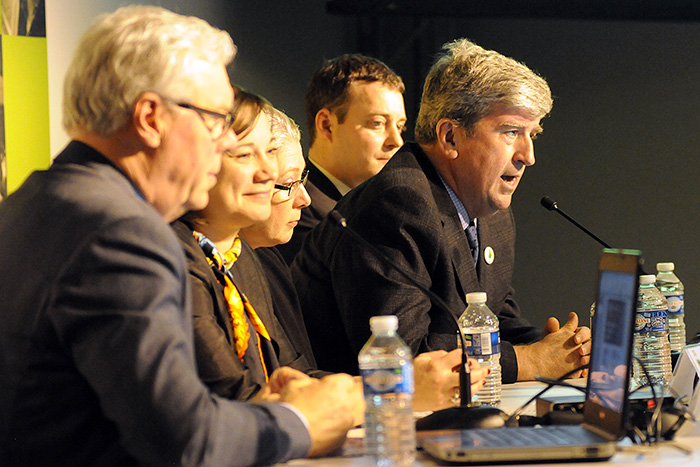 Panel during the Canadian Premiers' event.
Panel during the Canadian Premiers' event.
The Intergovernmental Panel on Climate Change (IPCC) at a Crossroads:
Enhancing the Usefulness of the IPCC to the UNFCCC Process Presented by:
Fondazione Eni Enrico Mattei (FEEM), Harvard University,
Potsdam Institute for Climate Impact Research (PIK) and Stanford University
This event, moderated by Robert Stavins, Harvard University, addressed assessment making, the role of the IPCC and its relation with other assessment bodies that may emerge after COP 21.
Stavins presented findings from the project ‘IPCC at a Crossroads: Opportunities for Reform,’ explaining it reflected on the Panel’s past work, capturing what was effective and what could be improved. He highlighted the need for: better scoping; targeted research on selected topics; new means to communicate information; better analysis at the sub-global level; and focus on response options. He suggested possible structural changes to the work of the IPCC, with Working Group (WG) I focusing on natural science aspects, and WG II focusing on mitigation, adaptation and socio-economic implications.
Comparing the work of the IPCC to that of a “map-maker,” Ottmar Edenhofer, PIK, shared insights from his experience as Co-Chair of WG III, outlining challenges for the IPCC’s sixth Assessment Report (AR6), including: assessing the impacts of different emissions scenarios and their differential costs; and the need to explain past emissions from different perspectives, to develop better assessment and scoping tools, and to make use of formats that enable more timely and rapid delivery of solutions to policy relevant questions.
Charles Kolstad, Standford University, highlighted practical steps to make the IPCC more useful, including: improved analysis of what is to be considered as dangerous climate change; providing parties with information to support their Intended Nationally Determined Contributions (INDCs); improved report scoping; ensuring greater diversity between lead authors; and involving professional organizations.
Carlo Carraro, FEEM and IPCC, presented on the IPCC communication strategy and on the scoping of IPCC reports, highlighting the need for new tools, greater effectiveness, new language, and better use of social media. On scoping, he underscored, inter alia, greater interaction with policy makers and the need for more special reports on selected issues.
Hoesung Lee, Chair, IPCC, presented on the IPCC’s future, stressing the need for, inter alia: greater collaboration between the science and decision-making communities; improving the way the IPCC communicates its findings; additional knowledge on the co-benefits and side-effects of mitigation actions; more meaningful engagement of the business sector; and greater research on economic costs of unmitigated climate change. He further emphasized the need for training and assistance to developing country scientists.
The ensuing discussion focused on: the role of methodologies in IPCC reports; the re-structuring of IPCC WGs; building capacity to engage more developing country authors in IPCC reports; IPCC procedures and processes; and whether or not the 2°C target can be achieved.
 Hoesung Lee, Chair, IPCC, presented on the future of the IPCC.
Hoesung Lee, Chair, IPCC, presented on the future of the IPCC.
| 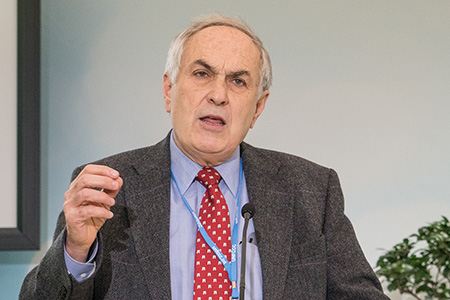 Charles Kolstad, Standford University, explained that the 2°C target is not the result of careful IPCC analysis, but only a focal point.
Charles Kolstad, Standford University, explained that the 2°C target is not the result of careful IPCC analysis, but only a focal point.
|
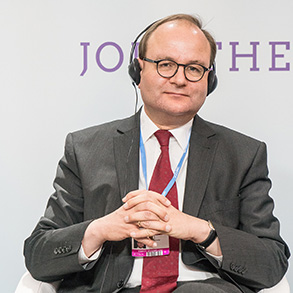 Ottmar Edenhofer, PIK, compared the work of the IPCC to that of a “map-maker.”
Ottmar Edenhofer, PIK, compared the work of the IPCC to that of a “map-maker.”
| 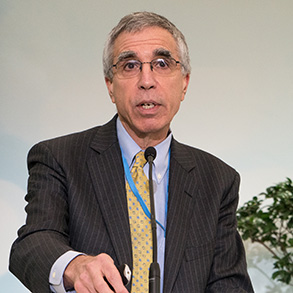 Robert Stavins, Harvard University, asked whether the IPCC is doing the right thing and whether it is doing things right.
Robert Stavins, Harvard University, asked whether the IPCC is doing the right thing and whether it is doing things right.
| 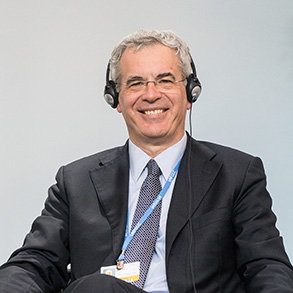 Carlo Carraro, FEEM and IPCC, highlighted the need for the IPCC to target a broader audience, rather than just experts and policymakers.
Carlo Carraro, FEEM and IPCC, highlighted the need for the IPCC to target a broader audience, rather than just experts and policymakers.
|
 Panel (L-R):
Ottmar Edenhofer, PIK; Charles Kolstad, Standford University; Carlo Carraro, FEEM and IPCC; and Hoesung Lee, Chair, IPCC.
Panel (L-R):
Ottmar Edenhofer, PIK; Charles Kolstad, Standford University; Carlo Carraro, FEEM and IPCC; and Hoesung Lee, Chair, IPCC.
|
Climate Success Stories from Subnational Governments Presented by: International Institute for Sustainable Development (IISD)
Moderator Scott Vaughan, President and CEO, IISD, introduced the session, which considered the initiatives being undertaken at the subnational level in Canadian provinces.
Greg Selinger, Premier, Manitoba, Canada, underscored the importance of partnerships with local communities, stating that building green assets must happen in partnership with First Nations through sustainable economic development models with inclusive social justice components. He encouraged engaging people in taking responsibility for their own behavior through carbon stewardship initiatives, and setting science-based standards.
Mary Polak, Minister of Environment, British Columbia, Canada, presented ground-breaking legislation in her province, including the 2007 introduction of a revenue-neutral carbon price that has led to a reduction in emissions and fuel consumption at the same time as “fast, real GDP growth.” She highlighted the significance of involving First Nations in decision-making, describing processes directly involving local communities that have reduced conflicts.
Shannon Phillips, Minister of Environment and Parks, Alberta, Canada, spoke on the economy-wide carbon price to be implemented in Alberta, underscoring its progressive fiscal policy related to adjustments, in which rebates will be provided to low and middle income families to ensure the pricing system does not jeopardize families’ ability to make ends meet. On investment, she said further work was required with respect to renewable energy investments in green technologies and phasing out coal in a way that respects the workers and communities where coal plants are currently located.
Glen Murray, Minister of Environment and Climate Change, Ontario, Canada, reported on climate change predictions envisaging a “difficult reality” for Ontario, in which average temperature will increase by 4ºC by 2050, including increases of up to 7ºC in the Arctic areas. He highlighted impacts of climate change including false springs that are destroying food crops, leading to economic and food security issues, such as dependence on imports, and discussed potential plans to establish a “continental carbon price,” involving Mexico and the US.
Randy Delorey, Minister of Environment, Nova Scotia, Canada, outlined Nova Scotia’s particular coastal geography that makes it sensitive to impacts of climate change related to sea-level rises and storms, noting that large floods would be capable of blocking road and rail access and causing major economic and food security impacts. Explaining that most of Nova Scotia’s emissions come from the electricity sector, he described hard emission caps that have transformed the sector, putting it on track to meet its goal of reducing emissions by 10% by 2020, relative to 1990 levels.
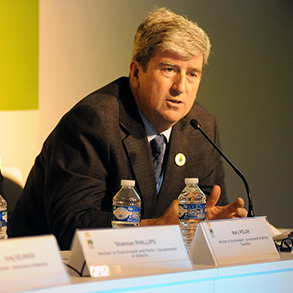 Glen Murray, Minister of Environment and Climate Change, Ontario, Canada, spoke on the IISD Experimental Lakes Area in Ontario.
Glen Murray, Minister of Environment and Climate Change, Ontario, Canada, spoke on the IISD Experimental Lakes Area in Ontario.
| 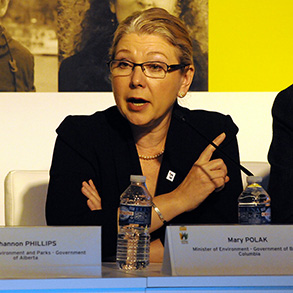 Mary Polak, Minister of Environment, British Columbia, Canada, spoke on a climate action charter that involves local communities and returns carbon tax paid upon fulfilment of criteria, such as monitoring their emissions.
Mary Polak, Minister of Environment, British Columbia, Canada, spoke on a climate action charter that involves local communities and returns carbon tax paid upon fulfilment of criteria, such as monitoring their emissions.
| 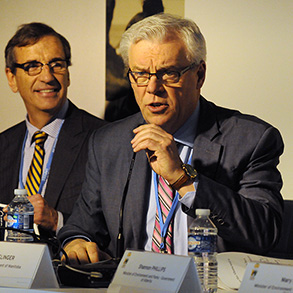 Greg Selinger, Premier, Manitoba, Canada, said joint ownership of environmental projects was capable of providing significant job opportunities for First Nations, as well as long term revenue streams.
Greg Selinger, Premier, Manitoba, Canada, said joint ownership of environmental projects was capable of providing significant job opportunities for First Nations, as well as long term revenue streams.
|
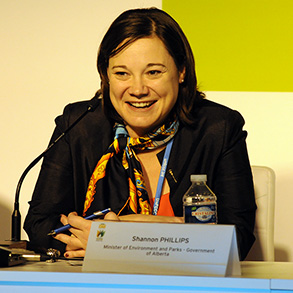 Shannon Phillips, Minister of Environment and Parks, Alberta, Canada, said renewable energy projects that demonstrate meaningful indigenous participation and capacity building should be given preference.
Shannon Phillips, Minister of Environment and Parks, Alberta, Canada, said renewable energy projects that demonstrate meaningful indigenous participation and capacity building should be given preference.
| 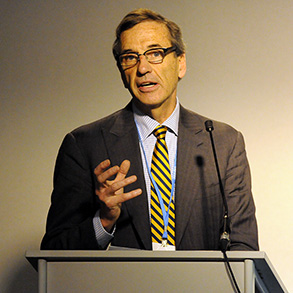 Scott Vaughan, President and CEO, IISD, acknowledged the high degree of innovation and commitment coming from Canadian provinces in climate change adaptation and mitigation.
Scott Vaughan, President and CEO, IISD, acknowledged the high degree of innovation and commitment coming from Canadian provinces in climate change adaptation and mitigation.
| 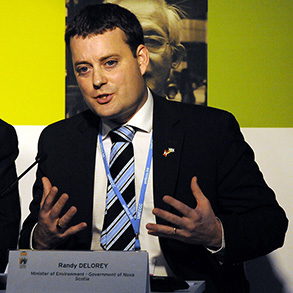 Randy Delorey, Minister of Environment, Nova Scotia, Canada, reported that renewable energy now makes up 25% of electricity generation, and that the province aims to expand this to 40% by 2020.
Randy Delorey, Minister of Environment, Nova Scotia, Canada, reported that renewable energy now makes up 25% of electricity generation, and that the province aims to expand this to 40% by 2020.
|
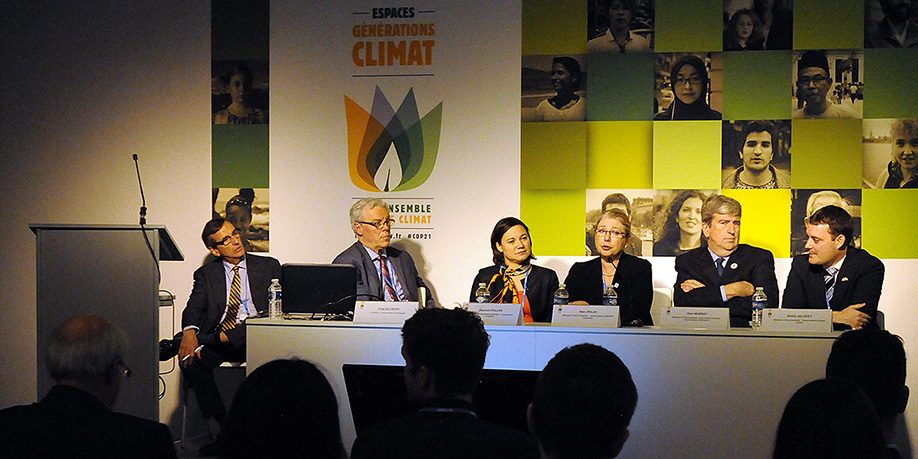 Panel (L-R):
Scott Vaughan, President and CEO, IISD; Greg Selinger, Premier, Manitoba, Canada; Shannon Phillips, Minister of Environment and Parks, Alberta, Canada; Mary Polak, Minister of Environment, British Colombia, Canada; Glen Murray, Minister of Environment and Climate Change, Ontario, Canada; and Randy Delorey, Minister of Environment, Nova Scotia, Canada.
Panel (L-R):
Scott Vaughan, President and CEO, IISD; Greg Selinger, Premier, Manitoba, Canada; Shannon Phillips, Minister of Environment and Parks, Alberta, Canada; Mary Polak, Minister of Environment, British Colombia, Canada; Glen Murray, Minister of Environment and Climate Change, Ontario, Canada; and Randy Delorey, Minister of Environment, Nova Scotia, Canada.
|
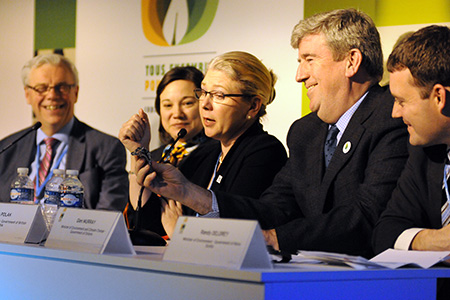
| 
|
Multi-Level Climate Governance: An Integrated Analysis of National, Regional and Local Policies Presented by: Bocconi University, Fondazione Eni Enrico Mattei (FEEM) and University of Edinburgh
This event, moderated by Carlo Carraro, Fondazione Eni Enrico Mattei (FEEM), addressed multi-level climate change governance, providing insights from national, regional, and urban policies and commitments.
Underscoring the bottom-up nature of Intended Nationally Determined Contributions (INDCs), Edoardo Croci, Bocconi University, presented on the interaction between levels of climate change mitigation and governance. He emphasized that sub-national actors have been increasingly recognized as key players for climate change mitigation, calling for a multi-stakeholder and multilevel approach to the implementation of INDCs.
Noting the need to build on what is achieved in Paris, Scott Barrett, Columbia University, presented on post-COP 21 climate policy and negotiations. He emphasized as crucial deliverables from COP 21: solidarity; the recognition that all countries are part of the problem, as well as of the solution; and provisions on measurement, reporting and verification (MRV), and on periodic assessment and review of ambition.
Based on modelling developed by FEEM, Massimo Tavoni, FEEM, presented results of a comparative assessment of efforts in INDCs. He underscored that the question is not whether INDCs are compatible with a 2°C goal, but what action we take post-2020. He concluded that there is much scope for increasing effectiveness and efficiency in INDCs, whereas the level of equity varies, depending on considerations related to wider economic repercussions.
Almut Arneth, Karlsruhe Institute of Technology, presented on ecosystem services and natural capital, and their importance for land-use change mitigation, providing insights from dynamic global vegetation models, and illustrating trade-offs between mitigation and CO2 fertilization on yields.
Christopher Kennedy, Toronto University, presented on urban emissions, their drivers and urban mitigation strategies, calling for the decarbonization of electricity supply and for the development of “electric cities.”
Benedetta Lucchitta, Bocconi University, presented on the role of regional authorities in climate governance, reporting the findings of the Coopenergy project, describing as success factors, inter alia: stakeholder involvement; funding; energy planning expertise; and multi-level governance facilitating processes or structures.
Describing climate control as a public good, Giandomenico Magliano, Italian Ambassador to France, stressed the importance of achieving climate change mitigation in line with other societal priorities.
Ensuing discussion focused on: challenges to multi-level governance; the role of ecosystem services in scaling down climate change mitigation to the local level; and criteria to measure success.
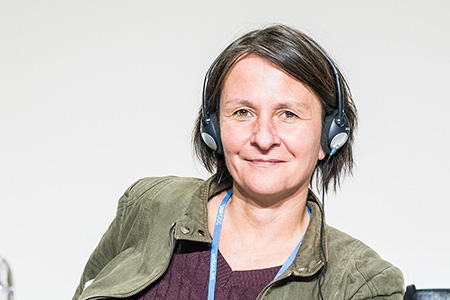 Almut Arneth, Karlsruhe Institute of Technology, presented on ecosystem services and natural capital.
Almut Arneth, Karlsruhe Institute of Technology, presented on ecosystem services and natural capital.
| 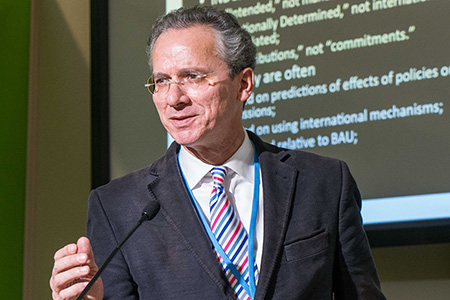 Scott Barrett, Columbia University, presented on post-COP 21 climate policy and climate negotiations.
Scott Barrett, Columbia University, presented on post-COP 21 climate policy and climate negotiations.
|
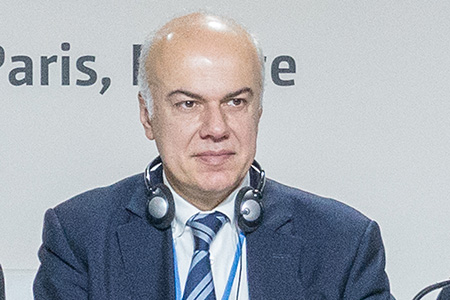 Edoardo Croci, Bocconi University, presented on the interaction between levels of climate change mitigation governance.
Edoardo Croci, Bocconi University, presented on the interaction between levels of climate change mitigation governance.
| 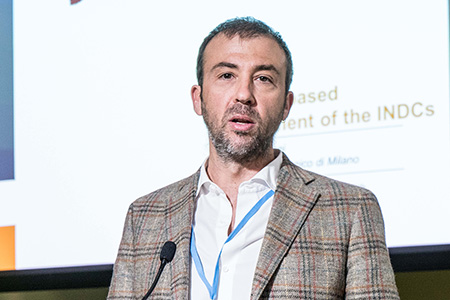 Massimo Tavoni, FEEM, presented results of a comparative assessment of levels of efforts in INDCs.
Massimo Tavoni, FEEM, presented results of a comparative assessment of levels of efforts in INDCs.
|
 Panel (L-R):
Martina Marian, FEEM; Massimo Tavoni, FEEM; Benedetta Lucchitta, Bocconi University; Edoardo Croci, Bocconi University; Carlo Carraro, FEEM; Almut Arneth, Karlsruhe Institute of Technology; Scott Barrett, Columbia University; and Christopher Kennedy, Toronto University.
Panel (L-R):
Martina Marian, FEEM; Massimo Tavoni, FEEM; Benedetta Lucchitta, Bocconi University; Edoardo Croci, Bocconi University; Carlo Carraro, FEEM; Almut Arneth, Karlsruhe Institute of Technology; Scott Barrett, Columbia University; and Christopher Kennedy, Toronto University.
|
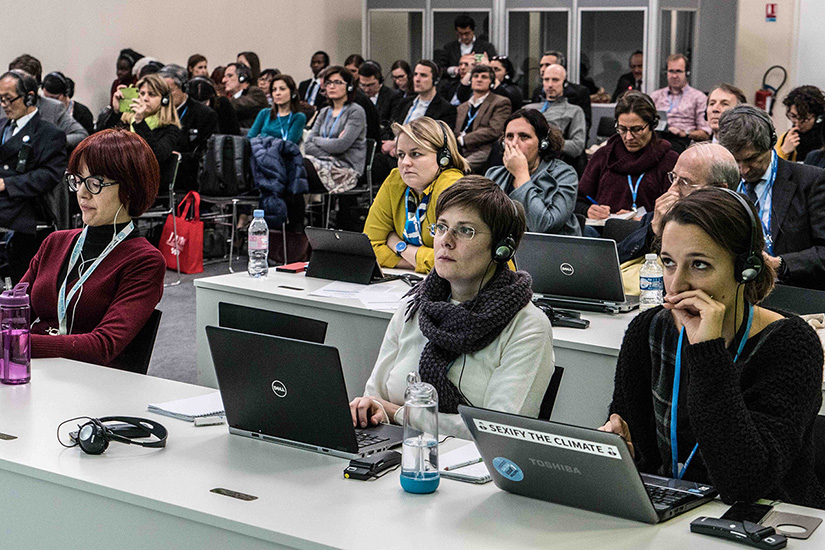
|
Building a Resilient Pacific Through Effective Weather Climate and Early Warning Systems Presented by: Secretariat of the Pacific Regional Environment Programme (SPREP); Government of Samoa; Ministry for Foreign Affairs, Finland; Finnish Meteorological Institute (FMI); Government of Vanuatu; UN Economic and Social Commission for Asia and the Pacific (ESCAP); World Meteorological Organization (WMO); International Federation of Red Cross and Red Crescent Societies; Pacific Meteorological Council; Bureau of Meteorology, Australia; Secretariat of the Pacific Community (SPC); and Pacific Center for Environment and Sustainable Development, University of South Pacific
This side event, moderated by Espen Ronneberg, SPREP, addressed a range of actions aimed at strengthening island resilience in the Pacific, by using effective research and systematic observations for weather, climate and effective early warning systems to prepare communities for climate-related disasters.
Kosi Latu, Deputy Director General, SPREP, underscored extreme weather events that devastated Vanuatu and Micronesia, noting their impacts on countries, livelihoods and national economies. He presented SPREP’s work with other partners to better prepare local communities to face the adverse impacts of climate change.
Jesse Benjamin, Ministry of Climate Change Adaptation, Meteorology and Geo-hazards, Disaster Management, Energy and Environment, Vanuatu, presented on the catastrophic effects of recent cyclones in Vanuatu. Noting that climate change is already a reality for Small Island Developing States (SIDS), he stressed that 70% of the population in Vanuatu lives in rural areas with minimal education, and underscored the need for capacity building in the region.
Petteri Taalas, Director General, FMI, addressed, among others: ocean warming since 1958; sea-level rise since 1700; the number of devastating natural disasters and economic losses; and FMI’s projects involving SIDS. As incoming Secretary General of WMO, he highlighted future key areas of work for the organization, including: supporting national meteorological and hydrological services (NMHSs); sharing expertise; establishing early warning, climate and hydrological services; building capacities for global observation and data-exchange; engaging scientific and development partners; and encouraging enhanced cooperation among members, including on joint infrastructure.
Shamshad Akhtar, Executive Secretary, UN ESCAP, noted that, in some cases, damages from natural disasters in SIDS surpass their Gross Domestic Product (GDP). She highlighted ESCAP’s work, including, inter alia: developing guidelines on mainstreaming disaster risk reduction (DRR) in multisectoral development planning; supporting knowledge sharing in addressing risks of typhoons and cyclones; assisting in the establishment of early-warning mechanisms for coastal hazards and tsunamis; and assisting in institutional capacity-building programs.
Ofa Fa'anunu, Director, Tonga Meteorological Service, focused on the key areas of the Nuku'alofa Declaration, saying its purpose is to draw attention to and mobilize support for the NMHSs, and ensure they have the necessary capacity to support sustainable development. He further discussed a pilot project on the Tongan island of Mo'unga'one, which aims to provide climate services for reducing community livelihood vulnerability.
Matti Nummelin, Ministry for Foreign Affairs, Finland, presented on the Finnish support for building capacities and resilience in SIDS. He underscored, inter alia: the Finnish-Pacific (FINPAC) project; the importance of delivering messages in a way locals understand; meteorological services as contributors to sustainable development; and Vaisala meteorological instruments and equipment.
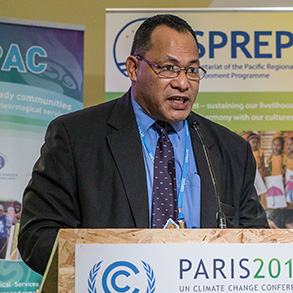 Kosi Latu, Deputy Director General, SPREP noted that for the Pacific, climate change is not a matter of discussion but of survival.
Kosi Latu, Deputy Director General, SPREP noted that for the Pacific, climate change is not a matter of discussion but of survival.
| 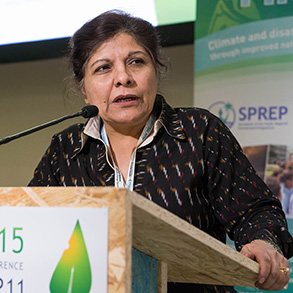 Shamshad Akhtar, Executive Secretary, UN ESCAP, underscored ESCAP’s role as an intergovernmental platform, ensuring that Pacific islands’ issues are well understood by all stakeholders.
Shamshad Akhtar, Executive Secretary, UN ESCAP, underscored ESCAP’s role as an intergovernmental platform, ensuring that Pacific islands’ issues are well understood by all stakeholders.
| 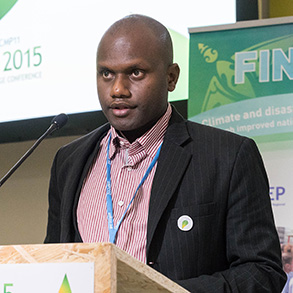 Jesse Benjamin, Vanuatu, cautioned "if our stories about facing cyclones won't become an inspiration for negotiating a climate agreement, they will become your stories."
Jesse Benjamin, Vanuatu, cautioned "if our stories about facing cyclones won't become an inspiration for negotiating a climate agreement, they will become your stories."
|
 Panel (L-R):
Espen Ronneberg, SPREP; Kosi Latu, Deputy Director General, SPREP; Ofa Fa'anunu, Director, Tonga Meteorological Service; Matti Nummelin, Ministry for Foreign Affairs, Finland; Petteri Taalas, Director General, FMI; Shamshad Akhtar, Executive Secretary, UN ESCAP; and Jesse Benjamin, Ministry of Climate Change Adaptation, Meteorology and Geo-hazards, Disaster Management, Energy and Environment, Vanuatu.
Panel (L-R):
Espen Ronneberg, SPREP; Kosi Latu, Deputy Director General, SPREP; Ofa Fa'anunu, Director, Tonga Meteorological Service; Matti Nummelin, Ministry for Foreign Affairs, Finland; Petteri Taalas, Director General, FMI; Shamshad Akhtar, Executive Secretary, UN ESCAP; and Jesse Benjamin, Ministry of Climate Change Adaptation, Meteorology and Geo-hazards, Disaster Management, Energy and Environment, Vanuatu.
|
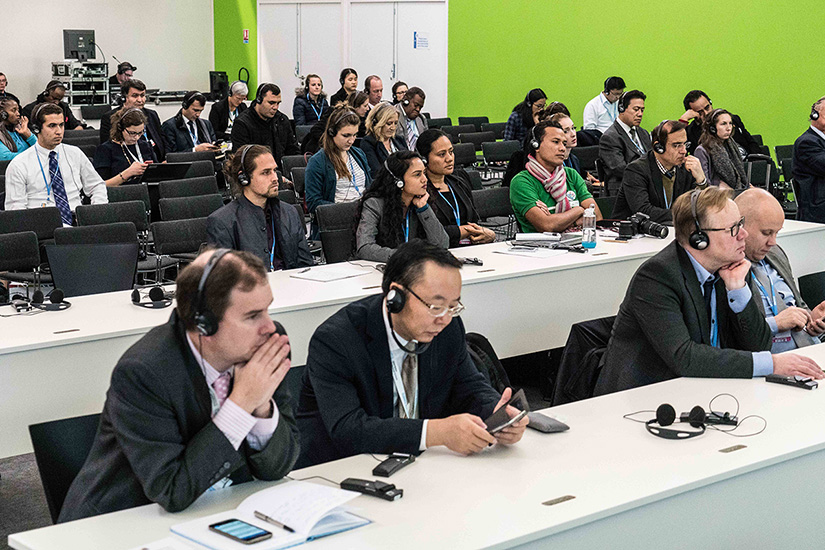
|
Contacts:
- Nanette Woonton (Coordinator) | nanettew@sprep.org
- Suluimalo Amataga Penaia (Coordinator) | ausetalia.titimaea@mnre.gov.ws
- Salesa Nihmei (Coordinator) | salesan@sprep.org
More Information:
High-Level Meeting on Climate Change and the Role of Markets and Trade: Leveraging Co-Benefits
Presented by:
UN Conference on Trade and Development (UNCTAD), World Trade Organization (WTO),
and International Trade Centre (ITC)
This event was moderated Adrian Macey, Victoria University of Wellington, who lamented that an environmental goods agreement being negotiated by the WTO will not be ready for adoption at the organization’s next Ministerial Conference.
Stressing that there is no contradiction between growth in trade and action on climate change, Arancha González, Executive Director, ITC , discussed ways in which trade can facilitate climate action, including opening access to markets for green goods and services, and supporting agricultural diversification efforts.
Noting that climate change jeopardizes trade, Joakim Reiter, Deputy Secretary-General, UNCTAD, called on multilateral trade institutions to “stop doing the wrong thing” by encouraging trade in goods and services with climate impacts; and to enhance trade in sustainable products, particularly environmentally-friendly technologies.
Karl Brauner, Deputy Director-General, WTO, called for the creation of a virtuous cycle of trade and environment which is pro-poor and pro-growth, but which also encourages sustainable development and sustainable consumption and production. In order to ensure trade policy plays its part post-COP21, he suggested a focus on: the dissemination of climate-friendly technologies; sustainable trade; and the full implementation of existing structures to further sustainable development, as well as new thinking on ensuring sustainable trade.
Tim Groser, Minister of Trade and Climate Change, New Zealand, noted the role of prices in dealing with climate change, highlighted the importance of addressing price distortions and externalities. He underscored the need to radically reform fossil fuel subsidies, and underlined the importance of ensuring that the infrastructure deficit is filled with green infrastructure.
Luis Enrique Berrizbeitia, Executive Vice President, Development Bank of Latin America (CAF), noted the Bank’s interest in biotrade, stressing that the preservation of ecosystems is the region’s most significant sustainable development challenge, but that it is also Latin America’s biggest contribution to mitigate climate change.
Margarita Astralaga, International Fund for Agriculture and Development (IFAD), called on the Paris agreement to prioritize agriculture, as smallholder farmers comprise a third of the world’s population. She stressed the need to assist smallholder farmers to withstand climate change shocks, and called on the private sector to partner with smallholders to increase market access.
Henry Neufeldt, World Agroforestry Centre (ICRAF), noted that agriculture, particularly the mechanized type, produces significant greenhouse gas emissions. He lauded the number of quality standards commitments from big business, but stressed the need for support for smallholder farmers to meet these standards.
In the discussion, participants considered, inter alia: the need for the multilateral trade frameworks dealing with environment to be coherent; and the need for global discussions on food waste.
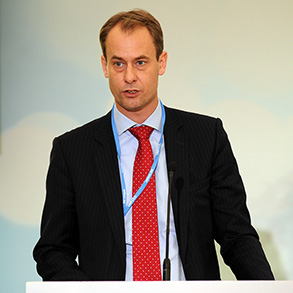 Joakim Reiter, Deputy Secretary-General, UNCTAD, said COP 21 is about the future of trade, noting that the outcome of the conference will determine “the power trade has to fight poverty.”
Joakim Reiter, Deputy Secretary-General, UNCTAD, said COP 21 is about the future of trade, noting that the outcome of the conference will determine “the power trade has to fight poverty.”
| 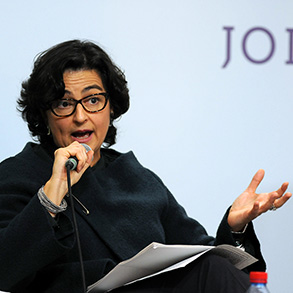 Arancha González, Executive Director, ITC, suggested addressing the link between climate change and trade through the lens of micro and small enterprises.
Arancha González, Executive Director, ITC, suggested addressing the link between climate change and trade through the lens of micro and small enterprises.
| 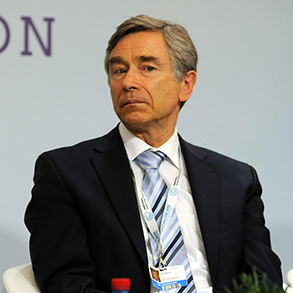 Karl Brauner, Director-General, WTO, called for increased cooperation between trade and environment communities to address climate change.
Karl Brauner, Director-General, WTO, called for increased cooperation between trade and environment communities to address climate change.
|
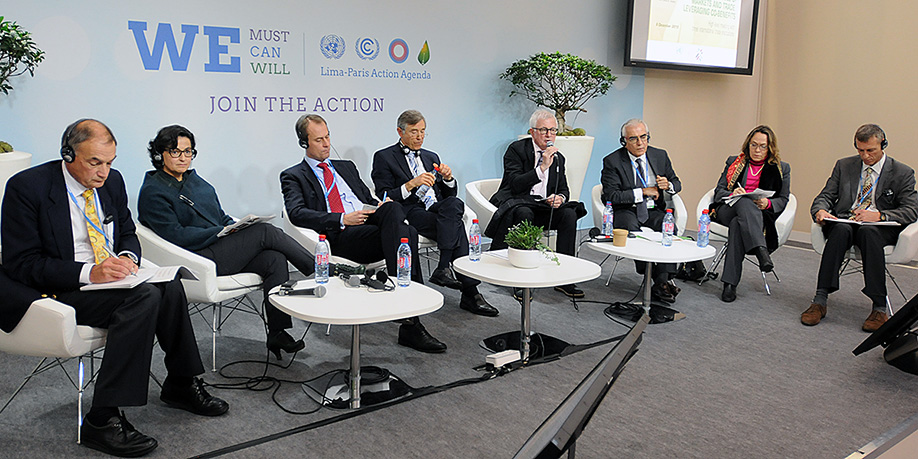 Panel (L-R):
Adrian Macey, Victoria University of Wellington; Arancha González, Executive Director, ITC; Joakim Reiter, Deputy Secretary-General, UNCTAD; Karl Brauner, Director-General, WTO; Tim Groser, Minister of Trade and Climate Change, New Zealand; Luis Enrique Berrizbeitia, CAF; Margarita Astralaga, IFAD; and Henry Neufeldt, ICRAF.
Panel (L-R):
Adrian Macey, Victoria University of Wellington; Arancha González, Executive Director, ITC; Joakim Reiter, Deputy Secretary-General, UNCTAD; Karl Brauner, Director-General, WTO; Tim Groser, Minister of Trade and Climate Change, New Zealand; Luis Enrique Berrizbeitia, CAF; Margarita Astralaga, IFAD; and Henry Neufeldt, ICRAF.
|
Global Market-Based Mechanisms for Reducing Emissions from Aviation and Shipping Presented by: European Parliament
This side event, moderated by Giovanni La Via, Member of the European Parliament, examined possible emissions reduction options for international aviation and shipping, including emissions trading, emission standards, and regulatory experiences in different regions of the world.
La Via noted that emissions from international aviation and shipping are expected to grow significantly in the coming decades, and stressed the urgency to act on a global scale to meet the 2°C goal.
Martin Cames, Öko-Institut, focused on emissions reduction standards, stressing, inter alia, that: efforts by the International Civil Aviation Organization (ICAO) and the International Maritime Organization (IMO) fall short of global mitigation requirements; to stay below 2°C, emissions from aviation and shipping should decrease by 41% and 63% respectively by 2050, compared to 2005 levels; there is need for technical and operational measures, as well as changes in offsets and behavior to achieve the targets; non-CO2 impacts of aviation will remain even if fossil fuels are substituted by alternative fuels; and mitigation targets will provide clear signals for potential investors.
Alice Bows-Larkin, University of Manchester, presented on mitigation opportunities and barriers in international transport. She highlighted challenges for aviation and shipping, noting that aviation presents fewer short-term technical options. She stressed, among others, that: shipping presents many technical options for emissions reductions, including slow steaming and technological retrofit; aviation and shipping have different mitigation paths; and the need for a fresh, positive and more sector-specific debate on international transport.
Jasper Faber, CE Delft, discussed the EU Emissions Trading Scheme (EU ETS) and other market-based mechanisms. He stressed that: emissions targets for aviation and shipping cannot be reached without market based measures; market measures need to allow for the use of extra-sectoral emission reductions to be cost-effective and to provide stable incentives; cheaper sectoral costs regarding ETS and offsetting schemes may appear attractive but fail to provide incentives for decarbonization; and regional schemes should be pursued when global measures are not feasible.
Jos Delbeke, European Commission, noted that aviation and shipping are not covered by Intended Nationally Determined Contributions (INDCs), expressing his hope that the EU formal submission will be incorporated in the final text of a Paris agreement. He stressed that aviation and maritime emissions are more important than currently described and urged for action at the national and international levels. He underscored that 2016 is an important year for both sectors, noting the upcoming ICAO Assembly and efforts to finalize a global agreement on monitoring, reporting and verification (MRV) for the maritime sector.
Tony deBrum, Minister of Foreign Affairs, Marshall Islands, described the dilemma his country is facing, being the third largest ship registry worldwide, while directly experiencing the effects of climate change. He noted that IMO is run and regulated by the industry, and thus the industry has an obligation to contribute to tackling climate change, stressing “the earlier we bring aviation and shipping along, the better for us all.”
In the ensuing lengthy discussions, participants addressed, inter alia: the political feasibility of regulating maritime emissions under the EU ETS; mitigation efforts by the industry in the two sectors; market-based solutions, on the understanding that climate change is essentially a market failure; effects of free trade agreements; and transparency in the negotiations.
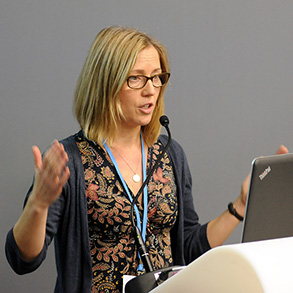 Alice Bows-Larkin, University of Manchester, said that shipping - in comparison to aviation - is less constrained by public expectations.
Alice Bows-Larkin, University of Manchester, said that shipping - in comparison to aviation - is less constrained by public expectations.
| 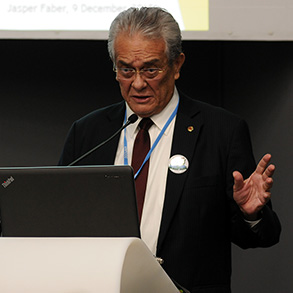 Tony deBrum, Minister of Foreign Affairs, Marshall Islands, noted “we are proud to be part of the industry, but would be more proud if the industry contributes to finding solutions to global problems.”
Tony deBrum, Minister of Foreign Affairs, Marshall Islands, noted “we are proud to be part of the industry, but would be more proud if the industry contributes to finding solutions to global problems.”
| 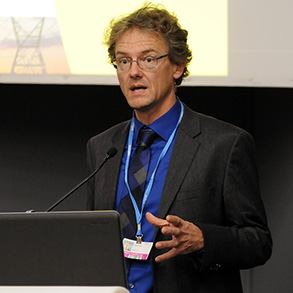 Jasper Faber, CE Delft, stressed that, without strong incentives, low-carbon fuel production will not be scaled up and related prices will not be reduced.
Jasper Faber, CE Delft, stressed that, without strong incentives, low-carbon fuel production will not be scaled up and related prices will not be reduced.
|
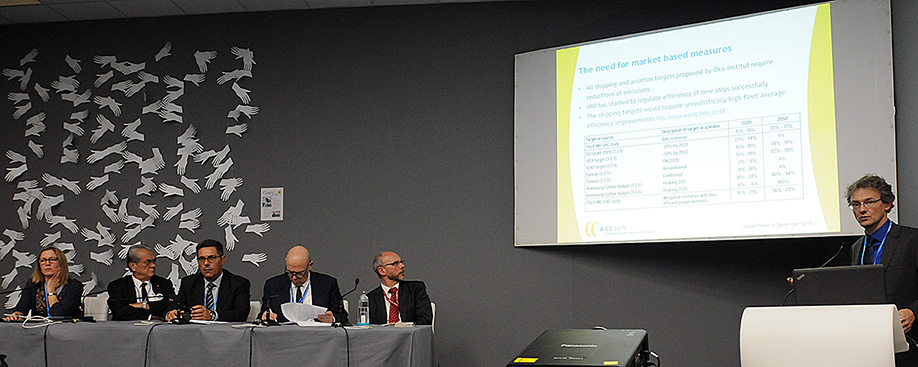 Panel (L-R):
Alice Bows-Larkin, University of Manchester; Tony deBrum, Minister of Foreign Affairs, Marshall Islands; Giovanni La Via, Member of the European Parliament; Jos Delbeke, European Commission; Martin Cames, Öko-Institut; and Jasper Faber, CE Delft.
Panel (L-R):
Alice Bows-Larkin, University of Manchester; Tony deBrum, Minister of Foreign Affairs, Marshall Islands; Giovanni La Via, Member of the European Parliament; Jos Delbeke, European Commission; Martin Cames, Öko-Institut; and Jasper Faber, CE Delft.
|

|
Contacts:
- Georgios Amanatidis (Coordinator) | georgios.amanatidis@europarl.europa.eu
More Information:
Planet at the Crossroads: Advancing Nature Based Solutions to Climate Change after Paris
Presented by:
International Union for Conservation of Nature (IUCN), Conservation International (CI),
and The Nature Conservancy (TNC)
This side event, moderated by Inger Andersen, Director General, IUCN, explored the use of nature-based solutions to achieve prosperity while respecting planetary boundaries. Justin Adams, Managing Director, TNC, opened the session by quoting François-René de Chateaubriand, saying “Forests precede civilizations and deserts follow them,” urging COP 21 to disprove this by finding ways to factor natural capital into all future development decisions.
Bernard Fautrier, Vice President, Prince Albert II Foundation, highlighted the importance of sustainable management of coral, sea grass and mangrove ecosystems for preserving biodiversity and “blue carbon.” He called for oceans and marine protected areas to be at the forefront of climate change actions.
M. Sanjayan, CI, noted that CI’s simple founding principle is “people need nature to thrive,” emphasizing the five ‘F’s fundamental to civilization: food and fish, fuel wood, fodder for livestock, fresh water, and fertility in the soil. He stated that nature-based solutions are often the only solutions that get better with time, as they continue to grow and become more resilient.
Neric Acosta, the Philippines, stated that for his country “resilience is our new freedom.” He noted that resilience and disaster risk reduction are dependent on a robust system of protected areas and nature-based solutions.
Ségolène Royal, Minister of Ecology, Sustainable Development and Energy, France, lauded the work in the Philippines using green-and-grey infrastructures for coastal resilience, disaster risk reduction (DRR) and climate adaptation, which focuses on the use of natural systems, diverse ecosystems, nature-based solutions and biomimicry.
Peter Seligmann, CEO, CI, highlighted the absorptive capacity of forests and ecosystems as a major part of a global climate solution, and described “green-and-grey infrastructures,” which combine the ingenuity of human innovation and the genius of nature.
Francois-Xavier Duporge, Secretary General of the French Facility for Global Environment (FFEM), Royal, Acosta and Seligmann then signed a formal recognition of the green-and-grey infrastructures programme for coastal resilience, DRR and climate adaptation. In discussion, participants considered: the very low cost of nature-based solutions compared to other technological approaches; and potential actions for oceans beyond national jurisdiction.
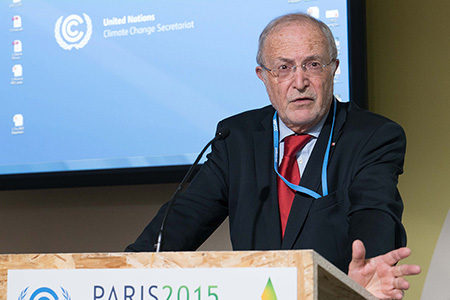 Bernard Fautrier, Vice President, Prince Albert II Foundation, called for an IPCC report focusing on oceans.
Bernard Fautrier, Vice President, Prince Albert II Foundation, called for an IPCC report focusing on oceans.
| 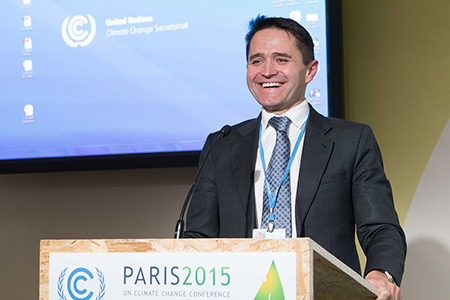 Justin Adams, Managing Director, TNC, asked “will we be the first generation to restore our planet, to ensure prosperity for future generations?”
Justin Adams, Managing Director, TNC, asked “will we be the first generation to restore our planet, to ensure prosperity for future generations?”
|
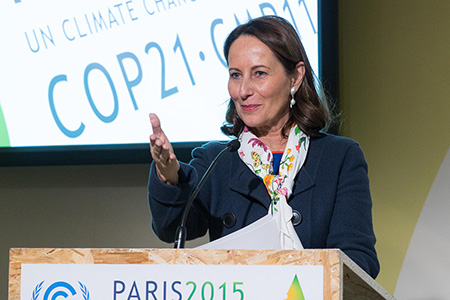 Ségolène Royal, Minister of Ecology, Sustainable Development and Energy, France, affirmed the use of nature-based solutions to improve coastal resilience, DRR and climate adaptation.
Ségolène Royal, Minister of Ecology, Sustainable Development and Energy, France, affirmed the use of nature-based solutions to improve coastal resilience, DRR and climate adaptation.
| 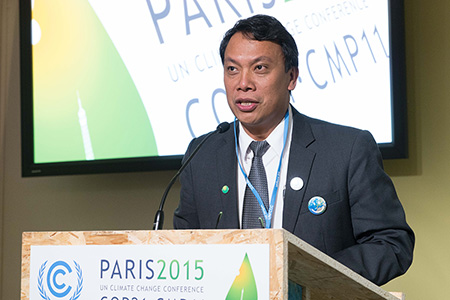 Neric Acosta, the Philippines, said “there is no economy without ecology,” noting that for his country, climate change is more about water, food and energy than about the abstract language within the UNFCCC.
Neric Acosta, the Philippines, said “there is no economy without ecology,” noting that for his country, climate change is more about water, food and energy than about the abstract language within the UNFCCC.
|
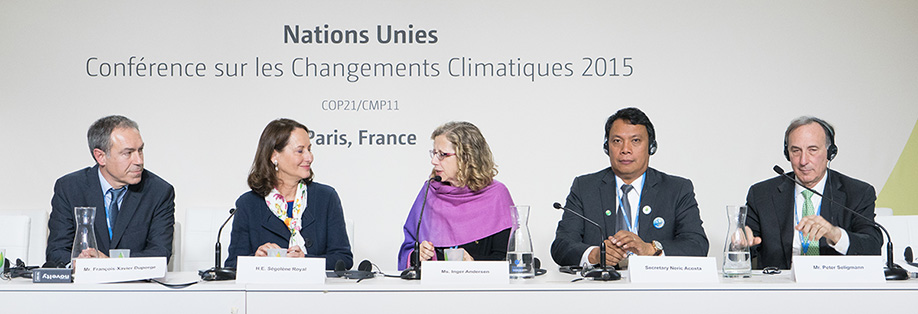 Panel (L-R):
Francois-Xavier Duporge, Secretary General of the French Facility for Global Environment (FFEM); Ségolène Royal, Minister of Ecology, Sustainable Development and Energy, France; Inger Andersen, Director General, IUCN; Neric Acosta, the Philippines; and Peter Seligmann, CEO, CI.
Panel (L-R):
Francois-Xavier Duporge, Secretary General of the French Facility for Global Environment (FFEM); Ségolène Royal, Minister of Ecology, Sustainable Development and Energy, France; Inger Andersen, Director General, IUCN; Neric Acosta, the Philippines; and Peter Seligmann, CEO, CI.
|
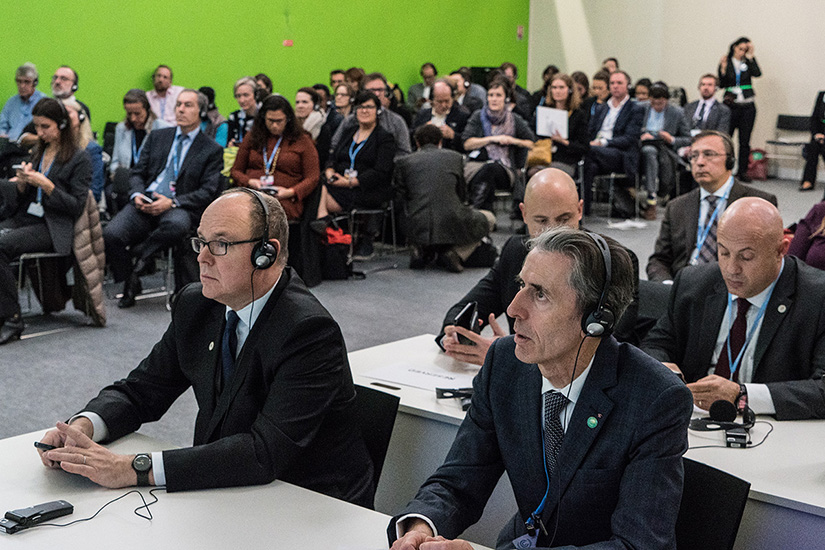
|
Contacts:
- Sandeep Sengupta (Coordinator) | sandeep.sengupta@iucn.org
- Rowan Braybrook (Coordinator) | rbraybrook@conservation.org
More Information:
Reducing Short-Lived Climate Pollutants for Quick Results on Climate and Development Presented by: Climate and Clean Air Coalition (CCAC)
This session considered different perspectives on Short-Lived Climate Pollutants (SLCPs) and activities to reduce their emissions. In an opening address, Drew Shindell, Chair, CCAC Scientific Advisory Panel, provided an update on the science relating to SLCPs, underscoring that action will be required to reduce both CO2 and SLCP levels in order to stay below the 1.5ºC or 2ºC temperature thresholds.
Moderator Durwood Zaelke, President, Institute for Governance and Sustainable Development (IGSD), introduced a panel discussion on national efforts to reduce black carbon and methane.
Kouamé Georges Kouadio, Director General, Ministry of Environment and Sustainable Development, Côte d’Ivoire, spoke on air quality management efforts in Côte d’Ivoire, highlighting a pilot project in Abidjan to manage SLCPs related to transport and waste, underscoring this as a direct outcome of the country’s CCAC membership.
Eneida De León, Vice Minister of Environment, Uruguay, spoke on work to improve air quality through emissions standards for new vehicles and particulate filters on public transport buses. She presented a pilot project in Montevideo to reduce black carbon emissions from diesel-heavy commercial vehicles, stating that this will be scaled up if successful.
Monica Silva Gonzalez, Peru, presented a diesel particulate filter pilot project in its final stages in Lima, reporting that Peru plans to upscale the implementation of filters to the national level and raise awareness on the health benefits of such measures.
Moderator Helena Molin Valdés, Head, CCAC, opened a second panel discussion, focusing on transformative action, challenges and cooperation to assess and implement SLCP initiatives.
Kamal Uddin Ahmed, Bangladesh, presented regulations in his country to support modern technologies, including the Brick Making and Brick Field Establishment Act. He explained projects for clean air and sustainable development that help small and medium businesses convert to environmentally friendly brick kilns to reduce black carbon and CO2 emissions.
Underscoring the seven million premature deaths caused by air pollution each year, Mark Lawrence, Institute for Advanced Sustainability Studies (IASS), spoke on the transdisciplinary approach of his organization to engage with a wide range of stakeholders and to widen awareness of air pollution, including through dialogues, and cooperation with local and regional scientists.
Dan McDougall, Ambassador for Climate Change, Canada, said the CCAC was a great opportunity for learning and for implementing collaborative action, underscoring the importance of collaboration with other governments, including at the subnational level.
Edward Cameron, Business for Social Responsibility (BSR), said work on SLCPs was vital to increasing ambition. Noting the enormous co-benefits from action, he pointed to the importance of effectively communicating the excitement felt within CCAC to the broader community.
In closing comments, Hanne Bjurstrøm, Co-Chair, CCAC, reiterated linkages with the private sector, underscoring the need to make sure CCAC is “not only talking, but acting.” She underscored the importance of an agreement in Paris, since the private sector is waiting for a strong signal to continue its innovative work.
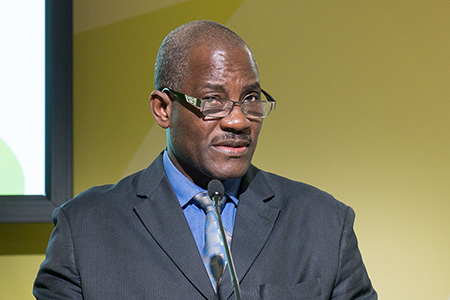 Kouamé Georges Kouadio, Director General, Ministry of Environment and Sustainable Development, Côte d’Ivoire, said that membership of CCAC at national level enabled important linkages to national communications to the UNFCCC.
Kouamé Georges Kouadio, Director General, Ministry of Environment and Sustainable Development, Côte d’Ivoire, said that membership of CCAC at national level enabled important linkages to national communications to the UNFCCC.
| 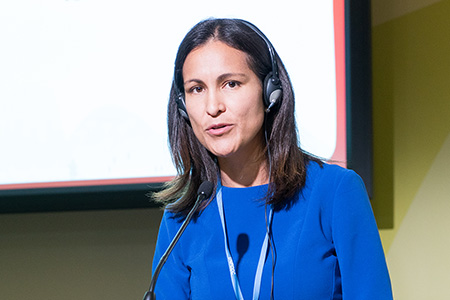 Monica Silva Gonzalez, Peru, said her country hoped to organize a sub-regional conference on the reduction of SLCPs emissions, focusing on topics including diesel and agriculture.
Monica Silva Gonzalez, Peru, said her country hoped to organize a sub-regional conference on the reduction of SLCPs emissions, focusing on topics including diesel and agriculture.
|
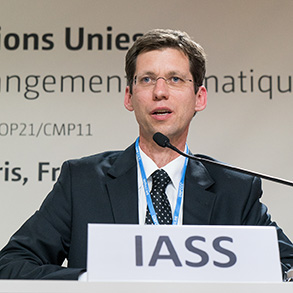 Mark Lawrence, IASS, said it is important to take a holistic approach focused on human health, sustainable development and human dignity.
Mark Lawrence, IASS, said it is important to take a holistic approach focused on human health, sustainable development and human dignity.
| 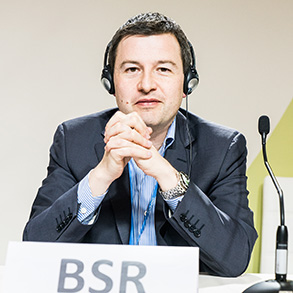 Edward Cameron, BSR, said CCAC needs to turn itself into a sales force and effectively sell actionable measures to encourage further engagement of the private sector.
Edward Cameron, BSR, said CCAC needs to turn itself into a sales force and effectively sell actionable measures to encourage further engagement of the private sector.
| 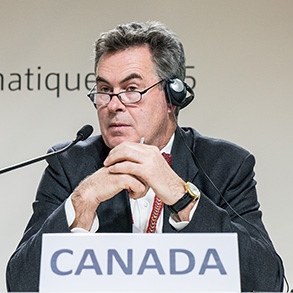 Dan McDougall, Ambassador for Climate Change, Canada, said taking action on SLCPs is a way of saving, rather than spending money, when the externalities and co-benefits are properly costed.
Dan McDougall, Ambassador for Climate Change, Canada, said taking action on SLCPs is a way of saving, rather than spending money, when the externalities and co-benefits are properly costed.
|
 Panel (L-R):
Durwood Zaelke, President, IGSD; Helena Molin Valdes, Head, CCAC; Kouamé Georges Kouadio, Director General, Ministry of Environment and Sustainable Development, Côte d’Ivoire; Eneida De León, Vice Minister of Environment, Uruguay; and Monica Silva Gonzalez, Peru.
Panel (L-R):
Durwood Zaelke, President, IGSD; Helena Molin Valdes, Head, CCAC; Kouamé Georges Kouadio, Director General, Ministry of Environment and Sustainable Development, Côte d’Ivoire; Eneida De León, Vice Minister of Environment, Uruguay; and Monica Silva Gonzalez, Peru.
|
 Panel (L-R):
Helena Molin Valdes, Head, CCAC; Kamal Uddin Ahmed, Secretary, Ministry of Environment and Forests, Bangladesh; Mark Lawrence, IASS; Dan McDougall, Ambassador for Climate Change, Canada; and Edward Cameron, BSR.
Panel (L-R):
Helena Molin Valdes, Head, CCAC; Kamal Uddin Ahmed, Secretary, Ministry of Environment and Forests, Bangladesh; Mark Lawrence, IASS; Dan McDougall, Ambassador for Climate Change, Canada; and Edward Cameron, BSR.
|
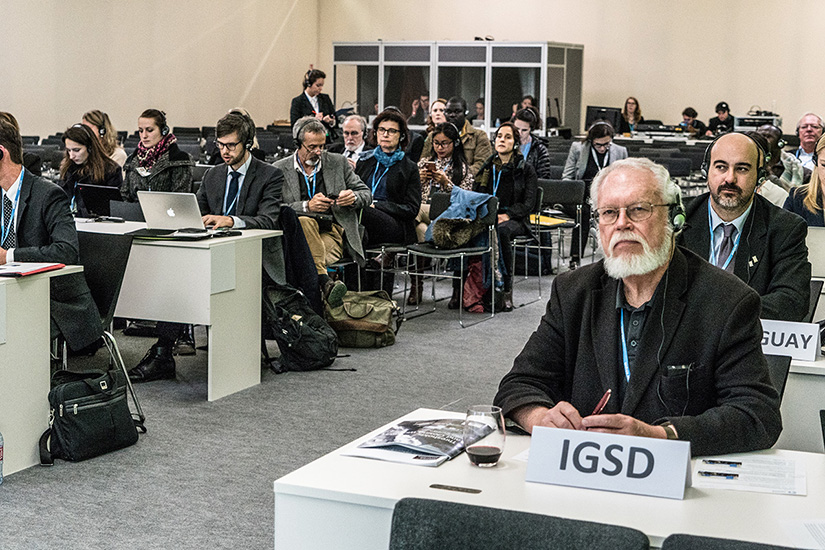
|
Health Central to Climate Change Action
Presented by:
Scientific Centre of Monaco, World Health Organization (WHO) Regional Office for Europe,
and Health and Environment Alliance (HEAL)
This side event, moderated by Patrick Rampal, President of the Scientific Centre of Monaco, Bettina Menne, WHO Regional Office for Europe, and Génon Jensen, Executive Director, HEAL, highlighted that strong and effective action to limit climate change is needed to avoid risks to global health.
Prince Albert II, Monaco, opened the session by highlighting the gravity of climate change impacts on health, including communicable and non-communicable diseases, malnutrition, food insecurity, thermal stress and health problems related to air pollution. Ségolène Neuville, Minister of State for Disabled People and the Fight Against Exclusion, urged better regional sharing of health and climate data; and thorough preventative approaches.
Zsuzsanna Jakab, Regional Director for Europe, WHO, stated many investments in climate mitigation are also investments in human health, noting the health co-benefits of addressing transboundary air pollution, transport, energy, buildings and agriculture. David King, Special Representative for Climate Change, UK, presented on the health consequences of climate change, questioning human capability to survive as extreme weather conditions increasingly become the norm. He noted the 2003 summer heatwave across central Europe, with 65,000-70,000 deaths, as the first large-scale climate-related disaster in Europe.
On the health benefits of a strong Paris agreement, Rita Schwarzelühr-Sutter, Ministry for the Environment, Nature Conservation, Building and Nuclear Safety, Germany, urged a strong climate agreement to minimize the loss of human life, saying that “climate action equals health protection.” Stana Božovć, State Secretary, Ministry of Agriculture and Environmental Protection, Serbia, urged intersectoral coordination to deliver climate mitigation and human health improvements, such as integrating cycling and walking into urban transport plans. Gina Radford, UK, emphasized the crucial role of medical professionals in educating the public about climate change, with Rampal urging appropriate training of health professionals to deliver key changes in behavior.
Michel Jarraud, Secretary General, World Meteorological Organization (WMO), emphasized the aggravating role climate change plays on health, as storms, dust storms, wildfires, droughts, heat waves and floods intensify. Christian Friis Bach, Executive Secretary, UN Economic Commission for Europe (UNECE), noted the international, legally-binding framework provided by the Gothenburg Protocol to the Convention on Long-Range Transboundary Air Pollution.
Hans Bruyninckx, Executive Director, European Environment Agency (EEA), highlighted the need to address production and consumption systems, noting, inter alia, global obesity levels. Jacqueline McGlade, Chief Scientist, UN Environment Programme (UNEP), underscored the need to tap into scientific and local knowledge – including Indigenous and traditional knowledge – to help science emerge and develop at the necessary rate.
Jensen called for a preventative approach which includes a stronger focus on ending fossil fuel dependency, noting annual global fossil fuel subsidies far exceed annual global healthcare expenditure. The ensuing discussion focused on: the role of health professionals in encouraging nutritious, rather than industrial, food systems; and adequate education among medical students around the world.
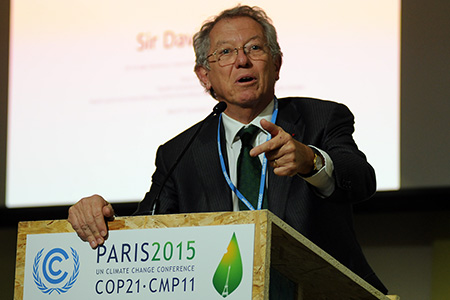 David King, Special Representative for Climate Change, UK, said “climate change is the greatest global health threat of the 21st Century.”
David King, Special Representative for Climate Change, UK, said “climate change is the greatest global health threat of the 21st Century.”
| 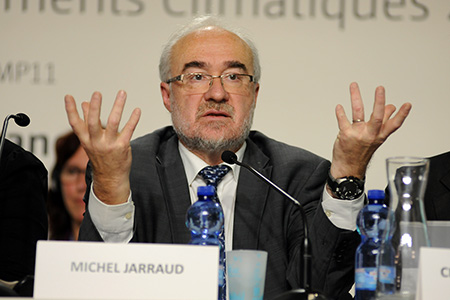 Michel Jarraud, Secretary-General, WMO, noted a joint unit between WHO and WMO focusing on climate and health.
Michel Jarraud, Secretary-General, WMO, noted a joint unit between WHO and WMO focusing on climate and health.
|
 Panel (L-R):
Bettina Menne, WHO Regional Office for Europe; Zsuzsanna Jakab, Regional Director for Europe, WHO; Ségolène Neuville, Minister of State for Disabled People and the Fight Against Exclusion; Prince Albert II, Monaco; Patrick Rampal, President of the Scientific Centre of Monaco; and Génon Jensen, Executive Director, HEAL.
Panel (L-R):
Bettina Menne, WHO Regional Office for Europe; Zsuzsanna Jakab, Regional Director for Europe, WHO; Ségolène Neuville, Minister of State for Disabled People and the Fight Against Exclusion; Prince Albert II, Monaco; Patrick Rampal, President of the Scientific Centre of Monaco; and Génon Jensen, Executive Director, HEAL.
|
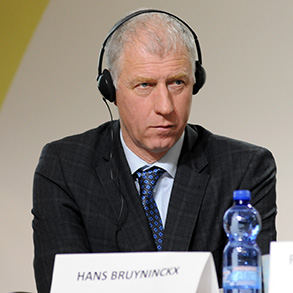 Hans Bruyninckx, Executive Director, EEA, noted the degradation of the natural capital base as a challenge for fundamental aspects of human health, asking “if this is not unsustainable, what is?”
Hans Bruyninckx, Executive Director, EEA, noted the degradation of the natural capital base as a challenge for fundamental aspects of human health, asking “if this is not unsustainable, what is?”
| 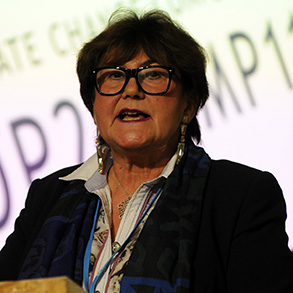 Zsuzsanna Jakab, Regional Director for Europe, WHO, noted that climate change has serious negative impacts on human health, and “Europe is not spared.”
Zsuzsanna Jakab, Regional Director for Europe, WHO, noted that climate change has serious negative impacts on human health, and “Europe is not spared.”
| 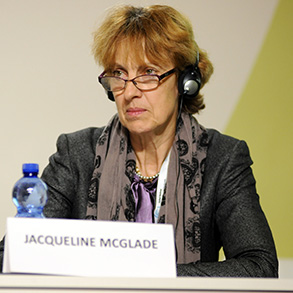 Jacqueline McGlade, Chief Scientist, UNEP, noted that “humans are only adapted to live in a very narrow range of temperatures,” and that scientific knowledge needs to “speed up” to keep pace with changing climates.
Jacqueline McGlade, Chief Scientist, UNEP, noted that “humans are only adapted to live in a very narrow range of temperatures,” and that scientific knowledge needs to “speed up” to keep pace with changing climates.
|
 Panel (L-R):
Hans Bruyninckx, EEA; Rita Schwarzelühr-Sutter, Parliamentary State Secretary to the Federal Ministry for the Environment, Nature Conservation, Building and Nuclear Safety, Germany; Zsuzsanna Jakab, Regional Director for Europe, WHO; Stana Božovć́ State Secretary, Ministry of Agriculture and Environmental Protection, Serbia; Michel Jarraud, Secretary-General, WMO; Christian Friis Bach, Executive Secretary, UNECE; Gina Radford, Deputy Chief Medical Officer, UK; and Jacqueline McGlade, Chief Scientist, UNEP.
Panel (L-R):
Hans Bruyninckx, EEA; Rita Schwarzelühr-Sutter, Parliamentary State Secretary to the Federal Ministry for the Environment, Nature Conservation, Building and Nuclear Safety, Germany; Zsuzsanna Jakab, Regional Director for Europe, WHO; Stana Božovć́ State Secretary, Ministry of Agriculture and Environmental Protection, Serbia; Michel Jarraud, Secretary-General, WMO; Christian Friis Bach, Executive Secretary, UNECE; Gina Radford, Deputy Chief Medical Officer, UK; and Jacqueline McGlade, Chief Scientist, UNEP.
|
Contacts:
- Patrick Rampal (Coordinator) | rampal@chpg.mc
- Anne Stauffer (Coordinator) | anne@env-health.org
More Information:
Why the Climate Change Agreement is Critical to Public Health Presented by: World Health Organization (WHO)
Margaret Chan, Director-General, WHO, cited new research estimating that reform of global energy subsidies could reduce CO2 emissions by more than 20%, reduce the number of premature deaths by more than half, and raise government revenues by nearly US$3 trillion a year. She called for: implementing and enforcing stricter vehicle emissions standards to reduce short lived climate pollutants (SLCPs), particularly black carbon; strengthening measures such as early-warning systems, and sanitation and hygiene services to promote resilience to climate shocks within the health sector; and investing in low-carbon development and renewable energy.
Richard Horton, Editor-in-Chief, The Lancet, urged tackling climate change, noting that it is the “greatest health opportunity of the 21st Century.” Noting that we are witnessing the eruption of climate change and its consequences, Marisol Touraine, Minister, Social Affairs, Health and Women’s Rights, France, credited WHO’s engagement in showing that climate and health are connected, calling for better integrating environmental factors in health policies.
Jeffrey Sachs, Columbia University, underscored the co-benefits of decarbonization are phenomenally large, and called for making sure that at COP 21 “we have the means to stop the danger of climate change, and to build the health systems.” Veerabhadran Ramanathan, University of California, described greenhouse gases (GHGs) and SLCPs as “the two levers for bending the curve in rising climate pollutants,” underscoring that, because of the intersection of air pollution and climate change, there is a powerful argument to address them both.
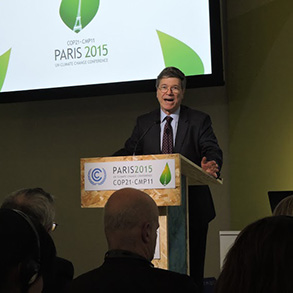 Jeffrey Sachs, Columbia University, said that the direct benefits of controlling human induced climate change, like the direct costs related to climate change, are “phenomenally large.”
Jeffrey Sachs, Columbia University, said that the direct benefits of controlling human induced climate change, like the direct costs related to climate change, are “phenomenally large.”
| 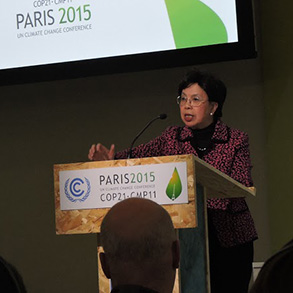 Margaret Chan, Director General, WHO, said that climate change degrades air quality, reduces food security, and compromises water supplies and sanitation.
Margaret Chan, Director General, WHO, said that climate change degrades air quality, reduces food security, and compromises water supplies and sanitation. | 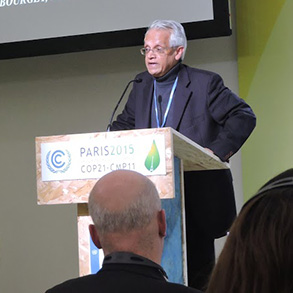 Veerabhadran Ramanathan, University of California, stressed that there is no evidence that cleaning up pollution is going to ruin the world’s economies.
Veerabhadran Ramanathan, University of California, stressed that there is no evidence that cleaning up pollution is going to ruin the world’s economies.
|
The Earth Negotiations Bulletin on the Side (ENBOTS) © <enb@iisd.org> is a special publication of the International Institute for Sustainable Development (IISD). This issue has been written by Lynn Finnegan, Tallash Kantai, Gillian Nelson, Ph.D., Annalisa Savaresi, Ph.D., and Asterios Tsioumanis, Ph.D. The Digital Editors are Naomi Devine and Brad Vincelette. The Editor is Dan Birchall <dan@iisd.org>. The Director of IISD Reporting Services is Langston James “Kimo” Goree VI <kimo@iisd.org>. The Sustaining Donors of the Bulletin are the European Union, the Government of Switzerland (the Swiss Federal Office for the Environment (FOEN), the Swiss Agency for Development and Cooperation (SDC)), and the Kingdom of Saudi Arabia. General Support for the Bulletin during 2015 is provided by the German Federal Ministry for the Environment, Nature Conservation, Building and Nuclear Safety (BMUB), the New Zealand Ministry of Foreign Affairs and Trade, SWAN International, the Finnish Ministry for Foreign Affairs, the Japanese Ministry of Environment (through the Institute for Global Environmental Strategies - IGES), the United Nations Environment Programme (UNEP), and the International Development Research Centre (IDRC). The opinions expressed in ENBOTS are those of the authors and do not necessarily reflect the views of IISD and funders. Excerpts from ENBOTS may be used in non-commercial publications only with appropriate academic citation. For permission to use this material in commercial publications, contact the Director of IISD Reporting Services at <kimo@iisd.org>. Electronic versions of issues of ENBOTS from the Paris Climate Change Conference - November 2015, can be found on the IISD Reporting Services website at http://enb.iisd.org/climate/cop21/enbots/. The ENBOTS Team at the Paris Climate Change Conference - November 2015, can be contacted by e-mail at <tallash@iisd.org>. |
||
|
IISD Reporting Services is grateful to the many donors of the Earth Negotiations Bulletin (ENB) and recognizes the following as core contributors to the ENB: the European Union, the Finnish Ministry for Foreign Affairs, the German Federal Ministry for the Environment, Nature Conservation, Building and Nuclear Safety (BMUB), the International Development Research Centre (IDRC), the Japanese Ministry of Environment (through the Institute for Global Environmental Strategies - IGES), the New Zealand Ministry of Foreign Affairs and Trade, the Kingdom of Saudi Arabia, SWAN International, Government of Switzerland (the Swiss Federal Office for the Environment (FOEN), the Swiss Agency for Development Cooperation (SDC), and the United Nations Environment Programme (UNEP). Funding for translation of the Bulletin into French is provided by the Government of France, the Wallonia, Québec, and the International Organization of La Francophonie/Institute for Sustainable Development of La Francophonie (IOF/IFDD). |
||